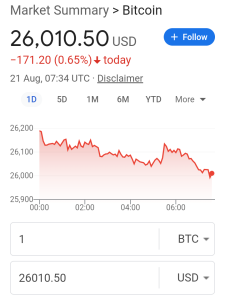Bitcoin experienced a sharp decline of around 12% this week, dropping below the $26,000 mark. Several factors contributed to this drop, including reduced trading activity, concerns about China’s property market crisis, and news about SpaceX’s sale of some of its bitcoin holdings.
The decrease in trading volumes on exchanges allowed larger trades to impact the price more significantly, resulting in increased price volatility. Glassnode and Coinshares reported a lack of interest in the crypto market, leading to the price decline. Coinshares also pointed out the connection between lower trading volumes and heightened price volatility.
Elon Musk’s involvement added to the uncertainty. Reports emerged that SpaceX had sold a portion of its bitcoin holdings, impacting market perception. Elon Musk’s previous tweets have influenced crypto prices, particularly meme coins like Dogecoin.

Regarding the recent drop, some experts linked it to China’s Evergrande Group filing for bankruptcy. Bitcoin, often likened to “digital gold,” tends to correlate with other risk-on assets during uncertain times, as observed at the beginning of the COVID-19 pandemic. However, Coinshares noted that a potential economic crisis could actually benefit bitcoin.
Despite the challenges, there were positive developments. Coinbase’s approval for offering crypto futures trading in the U.S. was a highlight of the week. Coinshares also mentioned that the market might need to adjust its expectations about the approval of a spot bitcoin ETF, particularly from BlackRock.
Also See:
- Elon Musk Puts an End to Rumors: No ‘X Coin’ in the Works
- Voyager Digital’s Token Transfer to Coinbase Sparks Speculation and Sell-Off Suspicions
In summary, Bitcoin’s 12% drop was influenced by decreased trading activity, concerns about China’s property market, and news of SpaceX’s bitcoin holdings sale. Elon Musk’s influence and the broader economic context played a role, but positive developments like Coinbase’s regulatory approval were also noteworthy.

 Bitcoin
Bitcoin  Ethereum
Ethereum  Tether
Tether  Solana
Solana  USDC
USDC  XRP
XRP  Lido Staked Ether
Lido Staked Ether  Toncoin
Toncoin  Dogecoin
Dogecoin  Cardano
Cardano  Shiba Inu
Shiba Inu  Avalanche
Avalanche  TRON
TRON  Wrapped Bitcoin
Wrapped Bitcoin  Polkadot
Polkadot  Bitcoin Cash
Bitcoin Cash  Chainlink
Chainlink  NEAR Protocol
NEAR Protocol  Polygon
Polygon  Litecoin
Litecoin  Internet Computer
Internet Computer  LEO Token
LEO Token  Dai
Dai  Uniswap
Uniswap  Fetch.ai
Fetch.ai  Pepe
Pepe  Render
Render  Hedera
Hedera  First Digital USD
First Digital USD  Ethereum Classic
Ethereum Classic  Aptos
Aptos  Cronos
Cronos  Cosmos Hub
Cosmos Hub  Wrapped eETH
Wrapped eETH  Mantle
Mantle  dogwifhat
dogwifhat  Immutable
Immutable  Filecoin
Filecoin  Stellar
Stellar  OKB
OKB  Stacks
Stacks  Renzo Restaked ETH
Renzo Restaked ETH  Optimism
Optimism  The Graph
The Graph  Arbitrum
Arbitrum  Arweave
Arweave  Maker
Maker  Monero
Monero  Bittensor
Bittensor  Ethena USDe
Ethena USDe  Sui
Sui  Injective
Injective  FLOKI
FLOKI  Theta Network
Theta Network  THORChain
THORChain  Fantom
Fantom  Rocket Pool ETH
Rocket Pool ETH  Bonk
Bonk  Celestia
Celestia  Lido DAO
Lido DAO  GALA
GALA  Jupiter
Jupiter  Algorand
Algorand  Core
Core  WhiteBIT Coin
WhiteBIT Coin  Mantle Staked Ether
Mantle Staked Ether  Quant
Quant  Sei
Sei  Flow
Flow  Aave
Aave  Akash Network
Akash Network  Bitcoin SV
Bitcoin SV  BitTorrent
BitTorrent  Beam
Beam  SingularityNET
SingularityNET  Worldcoin
Worldcoin  Ondo
Ondo  dYdX
dYdX  Cheelee
Cheelee  Gate
Gate  NEO
NEO  Ethena
Ethena  MultiversX
MultiversX  Chiliz
Chiliz  Zebec Protocol
Zebec Protocol  Ribbon Finance
Ribbon Finance  Axie Infinity
Axie Infinity  Wormhole
Wormhole  The Sandbox
The Sandbox  Tokenize Xchange
Tokenize Xchange  KuCoin
KuCoin  eCash
eCash  Marinade Staked SOL
Marinade Staked SOL  EOS
EOS  JasmyCoin
JasmyCoin